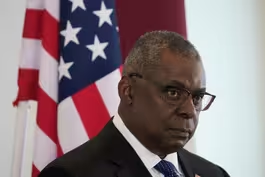
2023 beats record for hottest year on record by wide margin
Clip: 1/9/2024 | 5m 30sVideo has Closed Captions
2023 beats record for hottest year on record by larger than expected margin
Last year was the hottest on record by a long shot. Europe’s top climate agency released data showing 2023 global temperatures averaged 1.48 degrees Celsius above pre-industrial levels. Record-high temperatures are expected to continue this year. Amna Nawaz discussed the implications of this record heat with Radley Horton, a professor at Columbia University's Climate School.
Problems playing video? | Closed Captioning Feedback
Problems playing video? | Closed Captioning Feedback
Major corporate funding for the PBS News Hour is provided by BDO, BNSF, Consumer Cellular, American Cruise Lines, and Raymond James. Funding for the PBS NewsHour Weekend is provided by...

2023 beats record for hottest year on record by wide margin
Clip: 1/9/2024 | 5m 30sVideo has Closed Captions
Last year was the hottest on record by a long shot. Europe’s top climate agency released data showing 2023 global temperatures averaged 1.48 degrees Celsius above pre-industrial levels. Record-high temperatures are expected to continue this year. Amna Nawaz discussed the implications of this record heat with Radley Horton, a professor at Columbia University's Climate School.
Problems playing video? | Closed Captioning Feedback
How to Watch PBS News Hour
PBS News Hour is available to stream on pbs.org and the free PBS App, available on iPhone, Apple TV, Android TV, Android smartphones, Amazon Fire TV, Amazon Fire Tablet, Roku, Samsung Smart TV, and Vizio.
Providing Support for PBS.org
Learn Moreabout PBS online sponsorshipEurope's top climate agency released# data today showing global temperatures## averaged 1.48 degrees Celsius or 2.66# degrees Fahrenheit above preindustrial## levels.
Record high temperatures# are expected to continue this year.
For more on the implications of this record heat,## I'm joined by Radley Horton.
He's professor# Radley, welcome back.
So, the planet did shattered previous records.
Did we expect# to see that kind of increase this quickly?
RADLEY HORTON, Columbia University# Climate School: No, we did not.
At this point, gotten used to hearing this is the ninth# straight, the nine last years have been the## nine warmest on record.
But what we had happen# this year is that, over the last six months,## we were half-a-degree Fahrenheit height# warmer than any of those previous years.
So you could think of it like all the# previous years were stacked pretty close## together.
And along comes a year in# 2023 where the last six months were a## full half-a-degree warmer than any of those# previous years.
So this was not expected.
AMNA NAWAZ: So how do we account for that?# What drove that increase this past year?
RADLEY HORTON: Yes, well, we have# to start -- there's a few factors,## but we have to start with human# activities, the We're putting so much more heat in the system,# and there's growing concern among scientists## that we may have underestimated# just how sensitive the climate,## the Earth's temperature is to greenhouse gases as# they increase.
Are models missing some p But there are some other things going on# besides that -- those human activities.## We had a very -- a moderately strong# El Nino that's under way right now.## That can be responsible for some warming of the# planet, but not this much.
And then, simi we had a volcanic eruption under the ocean that# actually put water vapor up into the atmosphere,## which, unlike most volcanoes, is effective# to some degree at warming the planet, but,## again, couldn't anywhere come close to explaining# this degree of shattering of previous records.
AMNA NAWAZ: So we know global# warming doesn't just mean more## heat and hotter records.
We know it also# means more ext have we been seeing those?
Where is it# becoming real for these communities?
RADLEY HORTON: Yes, and there's so many examples.
I will highlight some of the ju st as the global average temperatures# did.
You look at the degree of so these heavy rain events, these tragic# floods in 2023, like we saw in Libya,## for example, in Greece, certainly# heat waves front and center, right?
We saw exceptional heat across# Southern Europe, across China,## across the Southern U.S.
So this is# hugely impactful for our economies,## for our ecosystems.
How about the forest fires# that we saw across Canada?
By some estimates,## four times more burned area than ever before# seen in Canada.
It's directly related to the## planet warming, more than we thought it could,# causing the air to dry out and essentially suck## moisture out of that vegetation, priming# the pump for these really extreme fires.
AMNA NAWAZ: And we should underscore,## we're ta I want to point out the U.S. alone had 28# weather disasters last year.
The combined damage killed 492 people and caused# nearly $93 billion in damage.
In short,## can we afford to continue at this pace?
RADLEY HORTON: Well, no, we can't.
We have to urgently reduce our We can see it by looking at the damages# this past year, economic and loss of life## and some of those things that don't# get captured by metrics like GDP.
But the additional concern, as you note,# because this year was so much warmer t prior years and because of growing evidence# that we may have underestimated how vulnerable## we as a society are to a little bit higher# temperatures, it's becoming clear that,## if we want to avert these worst-case scenarios# and possible really catastrophic outcomes that are## beyond what our climate models or our financial# models or our crop models tell us is possible, we## need to urgently reduce emissions and we have to# adapt to these climate changes that are under way.
AMNA NAWAZ: Radley, that 1.48 degree# increase is just barely below the## 1.5 degrees limit that the world agreed# upon as what they would like to avoid to,## as you mentioned, avoid those worst-case# scenarios and the most severe outcomes.
We talk about the tipping point a lot.
Is this it?
RADLEY HORTON: Well, I'd say we don't# need to focus exactly on Really, the key takeaway, I think, is that we# are failing terribly at reducing our emissions.## But you're right that it's becoming# more and more clear than it was just,## say, five years or so ago that getting to# 1.5 degrees is catastrophic for We have underestimated how vulnerable# our systems are.
We have underestimated## how quickly these extreme events like heat# waves and heavy rain are going to change.
So, in that sense, whether it's a tipping point or# not, we're way more vulnerable than w and it's even more urgent than we thought# that we dramatically reduce our emissions.
AMNA NAWAZ: Radley Horton, professor at# Columbia University's Climate School,## thank you so much for joining us.
RADLEY HORTON: Thank you.
Austin faces criticism for not disclosing hospitalization
Video has Closed Captions
Clip: 1/9/2024 | 4m 4s | Austin faces more criticism for delayed notification of cancer diagnosis, hospitalization (4m 4s)
Blinken tours Mideast in effort to keep war from spreading
Video has Closed Captions
Clip: 1/9/2024 | 4m 42s | Blinken tours Mideast in effort to keep Israel-Hamas war from spreading (4m 42s)
Boeing and FAA face scrutiny after door panel incident
Video has Closed Captions
Clip: 1/9/2024 | 5m 39s | Boeing and FAA face scrutiny over safety inspections after door panel incident (5m 39s)
How women's sports are breaking into mainstream coverage
Video has Closed Captions
Clip: 1/9/2024 | 7m 28s | How women's sports are breaking through and scoring big wins with mainstream audiences (7m 28s)
'Our Enemies Will Vanish' recounts Ukrainian resistance
Video has Closed Captions
Clip: 1/9/2024 | 7m 15s | New book 'Our Enemies Will Vanish' recounts Ukrainian resistance against Russian invasion (7m 15s)
The risk of criminal charges after experiencing miscarriage
Video has Closed Captions
Clip: 1/9/2024 | 6m 13s | The increasing risk of criminal charges for women who experience a miscarriage (6m 13s)
Trump's attorneys claim he's immune from Jan. 6 prosecution
Video has Closed Captions
Clip: 1/9/2024 | 5m 52s | The arguments Trump's attorneys are making to claim he's immune from Jan. 6 prosecution (5m 52s)
Providing Support for PBS.org
Learn Moreabout PBS online sponsorship
- News and Public Affairs

FRONTLINE is investigative journalism that questions, explains and changes our world.

- News and Public Affairs

Amanpour and Company features conversations with leaders and decision makers.












Support for PBS provided by:
Major corporate funding for the PBS News Hour is provided by BDO, BNSF, Consumer Cellular, American Cruise Lines, and Raymond James. Funding for the PBS NewsHour Weekend is provided by...






